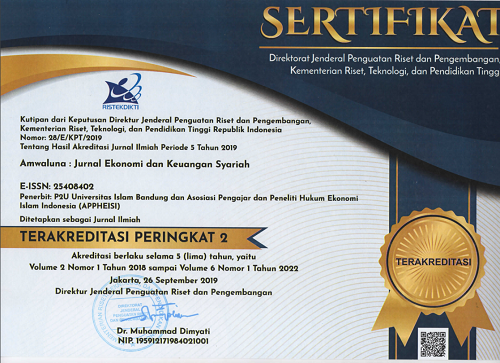STRATEGI KOMUNIKASI PARIWISATA HALAL STUDI KASUS IMPLEMENTASI HALAL HOTEL DI INDONESIA DAN THAILAND
Abstract
Indonesia menempati rangking pertama pada sepuluh destinasi favorit untuk liburan, dengan indeks 78 pada GMTI 2019. Pemerintah gencar mencanangkan pengembangan pariwisata halal. Namun perkembangan Hotel Halal di Indonesia tidak semarak di Thailand, yang diduga ada permasalahan komunikasi antara pemerintah dengan industri.Tujuan penelitian ini untuk mengkaji strategi komunikasi yang efektif dalam menyosialisasikan konsep hotel halal.Metode kualitatif menggunakan pendekatan studi kasus, dan teknik purposive sampling, pada pengelola hotel Halal di Bandung dan Bangkok. Hasil penelitian menunjukkan bahwa komunikasi dari pemerintah penting dalam memperkuat persepsi tentang product value dan benefit dari pariwisata halal. Latar belakang ada hotel halal karena faktor intrinsic yaitu agama dari pemilik dan exstrinsic yaitu, permintaan wisatawan dan biaya. Perbedaan perkembangan hotel halal, di Bangkok minat wisatawan muslim sangat tinggi, sehingga inisiatif datang dari pengusaha,sedangkan di Bandung, standar dasar halal dianggap sudah menyatu dalam kehidupan masyarakat, sehingga tidak urgent untuk menerapkan “branding” hotel halal. Untuk itu Model strategi komunikasi pariwisata efektif diperlukan pemerintah dalam pengembangan wisata halal.
Keywords
Full Text:
PDFReferences
Akyol, M., & KILINÇ, Ö. (2014). INTERNET AND HALAL TOURISM MARKETING. Electronic Turkish Studies, International Periodical For The Languages, Literature and History of Turkish, 9/8(February), 171–186.
Amadeus Traveller Trend Observatory. (2016). Halal Travellers 2016. In Amadeus-commissioned report conducted by Context Consulting (pp. 1–21). Madrid.
Ambali, A.R. and Bakar, A.N. (2013) ‘Halāl food and products in Malaysia: people’s awareness and policy implications’, Intellectual Discourse, Vol. 21, No. 1, pp.7–32.
Andriani, D., Khalikal, K. A., Aqmarina, L., Nurhayati, T., Permanasari, I. K., Binarwan, R., Anggraini, A. P. T. (2015). Laporan Akhir Kajian Pengembangan Wisata Syariah. Laporan Akhir Kajian Pengembangan Wisata Syariah, (Syariah Tourism), 1–201.
Ayob, N. M., & Masron, T. (2014). Issues of Safety and Security: New Challenging to Malaysia Tourism Industry. 4th International Conference on Tourism Research (4ICTR), 12(SHS Web of Conferences), 1–10. http://doi.org/10.1051/shsconf/20141201083
Bozorgaghideh, N. (2015). Halal tourism in kerala. International Journal of Management (IJM), IAME Publication, 6(8), 42–48.
Cancel, A. E., Cameron, G. T., Sallot, L. M., & Mitrook, M. A. (1997). It depends: A contingency theory of accommodation in public relations. Journal of Public Relations Research, 9(1), 31–63. doi:10.1207/s1532754xjprr0901_02
Chen, C., Chen, S., Lee, H., & Tsai, T. (2016). Ocean & Coastal Management Exploring destination resources and competitiveness e A comparative analysis of tourists â€TM perceptions and satisfaction toward an island of. Ocean and Coastal Management, 119, 58–67. https://doi.org/10.1016/j.ocecoaman.2015.09.013
Dallen, Timothy, J. (n.d.). Tourism and Islam: Consideration of culture and duty. Routledge Taylor & Francis Group.Djaelani, A. R. (2013). Teknik pengumpulan data dalam penelitian kualitatif. Majalah Ilmiah Pawiyatan, XX, 82–92.
Hallahan, K., Holtzhausen, D., Van Ruler, B., Verčič, D., & Sriramesh, K. (2007). Defining strategic communication. International Journal of Strategic Communication, 1(1), 3–35. doi:10.1080/15531180701285244
Harrigan, P., Evers, U., Miles, M., & Daly, T. (2017). Customer engagement with tourism social media brands. Tourism Management, 59, 597–609. https://doi.org/10.1016/j.tourman.2016.09.015
Holtzhausen, D., & Zerfass, A. (2015). Strategic communication: Opportunities and challenges of the research area. InD. R. Holtzhausen, & A. Zerfass (Eds.), The Routledge handbook of strategic communication (pp. 3–17). New York,NY: Routledge.
Iravani, M. R., & Mozaffari, A. M. (2013). Review The Status of Tourism from the Perspective of The Qur â€TM an. International Journal of Basics and Applied Sciences, 1(3), 628–633.
Kim, K.I., Syamil, A. and Bhatt, B.J. (2007) ‘A resource-based theory of supplier strategy’, International Journal of Logistics Systems and Management, Vol. 3, No. 1, pp.20–33.
Krech, David, Crutchfield, Richard S., & Ballachey, Egerton L., (1962), Individual in Society: A Textbook of Social Psychology, McGraw Hill, Kogakusha, Ltd.
Mastercard, B. (2016). MasterCard-Crescent Rating Global Muslim Travel Index 2016 Global Muslim Travel Index 2016, (March).
Nirwandar, S. (2012). Kata Sambutan Wakil Menteri Pariwisata Ekonomi Kreatif. In Prospek Bisnis Pariwisata Syariah (I, pp. vii–viii). Jakarta: Buku Republika.
Pandian V. K. M. (2013). Handbook of Research on Holistic Optimization Techniques in the Hospitality, Tourism and Travel Industry. In Business Science Reference (an imprint of IGI Global) (Vol. 53, pp. 1–199). Malaysia: IGI-GOBAL. http://doi.org/10.1017/CBO9781107415324.004
Pitana, G. dan I. G. (2005). Sosiologi Pariwisata. In Andi Offset. Yogyakarta.
Raj, R. and Griffin, K. (Ed.). (2015). Religious Tourism and Pilgrimage Management: An International Perspective. Dylunio Cymru (2nd ed.). Oxfordshire & Boston: CAB International.
Results, N., Utama, R., Bagus, G., Dhyana, U., Bali, P., Development, T. H. E., Bagus, G. (2015). Pariwisata Menurut Pandangan Islam dan Muslim.
Sweeney JC, Soutar GN, Johnson LW. 1999. The role of perceived risk in the quality – value relationship: a study in a retail environment. Journal of Retailing 75(1): 77–105.
Sha, B. L. (2007). Dimensions of public relations: Moving beyond traditional public relations models. In S. C. Duhé(Ed.), New media and public relations (pp. 3–25). New York, NY: Peter Lang.
Shafie dan Othman. (2006). Barriers to Halal logistics operation: views from
Malaysian logistics experts. Int. Journal. Logistics Systems and Management, Vol. 22, No. 2.
Shakiry, A. S. (2009). Islamic tourism means tourism based on ethical codes. The International Conference on Tourism of Islamic Countries.
Stephen, P. Robbins, J. T. (2015). Perilaku Organisasi (Organizational Behavior). In Jakarta: SalembaEmpat.
Sucipto, Hery; Andayani, F. (2014). Wisata Syariah: Karakter, Potensi, Prospek dan Tantangannya (I). Jakarta: Grafindo Books Media & Wisata Syariah Consulting.
Suherlan, A. (2015). PERSEPSI MASYARAKAT JAKARTA TERHADAP ISLAMIC. The Journal of Tauhidinomics, 1(1), 61–72.
Thalib, M.S., Hamid, A.B., Zulfakar, M.H., Chin, T.A. (2015). Barriers to Halal logistics operation: views from Malaysian logistics experts. Int. Journal. Logistics Systems and Management, Vol. 22, No. 2.
Wilson, J.A. and Liu, J. (2011) ‘The challenges of Islamic branding: navigating emotions and halal’, Journal of Islamic Marketing, Vol. 2, No. 1, pp.28–42.
Wonneberger,A., dan Jacobs,S. (2016). Mass Media Orientation and External
Communication Strategies: Exploring Organisational Differences, International Journal of Strategic Communication, DOI: 10.1080/1553118X.2016.1204613
Suardana, I. W. (2013). Analisis Kebijakan Pengembangan Pariwisata (Intervensi Melalui Kebijakan Pariwisata Berkelanjutan di Bali).
DOI: https://doi.org/10.29313/amwaluna.v4i1.5256
Refbacks
- There are currently no refbacks.
Editorial Office:
Syariah Faculty, Universitas Islam Bandung
Jalan Tamansari No. 24-26 Kota Bandung

Amwaluna : Jurnal Ekonomi dan Keuangan Syariah is licensed under a Creative Commons Attribution-NonCommercial-ShareAlike 4.0 International License.







